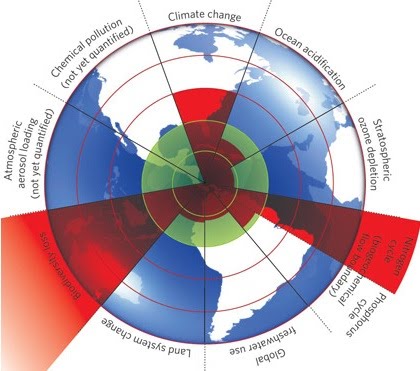
There are nine agreed planetary or biophysical boundaries that define the conditions that maintain the delicate balance for the earth’secosystems. It is also becoming increasingly understood that if one or more of these boundaries are breached and this delicate balance tipped even slightly out of kilter, the ramifications have the potential to undermine the conditions that have encouraged life to flourish on earth as we know it.
Of these nine boundaries – or thresholds – it has been agreed by scientists with extensive expertise in this matter (see for instance this article on Exploring the Safe Operating Space for Humanity) that three have already been crossed. And it is very likely that we will soon cross a fourth, if we have not already done so.
The three boundaries that are said to have been breached are: biodiversity loss, the nitrogen cycle and climate change. The fourth that we are creeping ever closer to crossing is the phosphorous cycle.
It will take some years to establish the ways in which breaching these boundaries affects life today, because there are many complex and interrelated factors that will determine how the impacts are played out. Indeed, it will take years before the effects are even understood by scientists – and even longer still before these observations and evaluations are compiled in reports and communicated to the wider public.
In light of this ‘time delay’ between noticing changes and having some tangible evidence to show what the effects might be, it might seem tempting to ignore that our actions today might have serious consequences tomorrow. If we think about planetary boundaries and the repercussions of breaching these, it might seem too nebulous to consider that sometime, somewhere the imbalances created by this breach might manifest as a negative impact later on; and that even minor shifts could reverberate throughout whole ecosystems and echo through time.
It might seem challenging to think about these issues, but just because we might not understand the complex process of cause and effect in relation to whole ecosystems, it shouldn’t be a reason to continue living as if it doesn’t exist at all. This is especially important if we consider our responsibility to hand over a healthy, well-balanced and thriving earth to our posterity. If we do accept this responsibility and we do aspire to minimising our negative impacts on earth, we must pay attention to the boundaries that determine the safe, well-established and well-understood operating systems that allow life to flourish. If we do not, breaching the boundaries might not necessarily bode ill for us today, but it will bode ill forgenerations to come.
Image taken from www.nature.com







